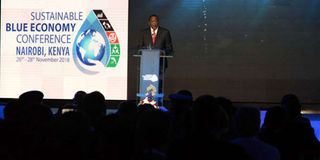Uhuru pledges Kenya's support for sustainable blue economy

President of Kenya Uhuru Kenyatta speaks during the Sustainable Blue Economy Conference at the KICC in Nairobi on November 26, 2018. PHOTO | SALATON NJAU | NATION MEDIA GROUP
What you need to know:
- President Kenyatta said Kenya will lead in the adoption of policies, strategies and mechanisms to harness so as to re-energise national economies and create more opportunities and jobs.
- He emphasised the need to confront the challenge of waste management and the plastic pollution that is compromising the health of people and water bodies.
- The president cited the ban on single use plastics and the adoption of an affordable housing programme in coastal cities as part of a broad programme for greening Kenya’s cities.
- He also called for global cooperation for success in the management of global aquatic resources for sustainable global development.
President Uhuru Kenyatta on Monday pledged Kenya’s support for the sustainable blue economy by highlighting key areas of focus as the first ever global conference opened in Nairobi.
President Kenyatta said Kenya will lead in the adoption of policies, strategies and mechanisms to harness so as to re-energise national economies and create more opportunities and jobs.
DIFFERENT MODEL
The president spoke while leading global leaders in making pledges and commitments to the blue economy at the historic conference, co-hosted by Kenya, Canada and Japan.
Senior Kenyan government officials including Deputy President William Ruto attended.
“I am convinced that for the sake of the present and future generations, and for the continued viability of our ecosystems, we have to envision a different future and, therefore, a different model for the blue economy. I pledge to envision that future and do my part to promote it,” President Kenyatta said.
The three-day gathering seeks to harness the promise and address the vulnerabilities of the blue economy.
WASTE MANAGEMENT
President Kenyatta further emphasised the need to confront the challenge of waste management and the plastic pollution that is compromising the health of people and water bodies and threatening food security and biodiversity on land and at sea.
He also underscored the need to ensure responsible and sustainable fishing to conserve endangered species and high value fish stocks, on which millions of people depend for their livelihoods.
The president further expressed the need to ensure safety and security in the high seas so that global trade, connectivity and all businesses can thrive unfettered.
As a move towards boosting the blue economy, he said his administration was taking steps to expand institutional governance mechanisms to enhance coordinated management of the blue economy.
“These include the Blue Economy Implementation Standing Committee as well as the State departments for fisheries and maritime logistics and transport,” President Kenyatta said.
The Kenyan leader said his administration was taking measures to revive Kenya’s maritime transport by building and expanding its ports and shipping facilities, and partnering with global shipping lines to extend its maritime reach.
“We are enhancing our capabilities for Kenya seafarers to work on ships across the vast oceans by, inter alia, upgrading the Kenya Maritime School,” he said.
“We have adopted a programme to accelerate the development of our fisheries, by increasing aquaculture, fish processing and storage capacities, and related blue economy industries, thereby creating employment opportunities for our people."
STEPS TAKEN
As part of Kenya’s efforts to revamp the blue economy, President Kenyatta last week commissioned the Liwatoni fisheries complex and jetty in Mombasa to enable docking of large fishing and patrol vessels.
He also announced the establishment of a fishing corporation.
Kenya has also ratified the Port State Measures Agreement that will ensure vessels flying the Kenyan flag comply with measures contained in that agreement.
President Kenyatta last week launched the Kenya Coast Guard Service to police waters and resources for full benefits.
“We are aggressively combating illegal, unregulated and unreported fishing, and have taken measures to enhance the security and safety of our collective waters,” President Kenyatta said.
The president cited the ban on single use plastics and the adoption of an affordable housing programme in coastal cities as part of a broad programme for greening Kenya’s cities.
“We shall further re-develop lake front cities and towns and release their great touristic and sustainable industrial potential,” President Kenyatta said.
ACQUATIC RESOURCES
President Kenyatta called for global cooperation for success in the management of global aquatic resources for sustainable global development.
Guests at the conference include President Yoweri Museveni (Uganda), Filipe Nyusi (Mozambique), Abdullahi Mohamed (Somalia), Dr Ali Mohammed Shein (Zanzibar) and Danny Faure of Seychelles.
They committed themselves to the preservation and protection of marine resources, noting that if well harnessed, they will significantly improve the global economy.
More than 18,000 participants from around the world are attending the global conference in which delegates are expected to come up with strategies to harness the potential of oceans, seas, lakes and rivers.
The goal is improve the lives of all, particularly people in developing states.
The delegates will also learn how to leverage the latest innovations, scientific advances and best practices for prosperity while conserving waters for future generations.




